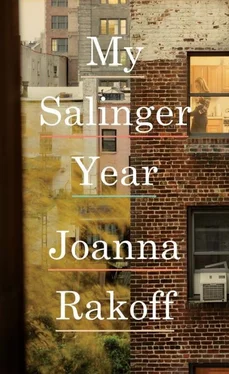I laughed. She sort of was. “There’s the ‘Hapworth’ deal.”
“Right,” he said, swishing the dregs of his drink. “The ‘ Hapworth ’ deal. That’s a doozy.” Max, I now knew, had been an actor in his youth—like my father—and he retained the precise articulation of the trade. “Wait!” he cried. “You were here for the—” He wrinkled his lips in thought. “Were you here for the letter thing? Or did that happen right before you started?” I shrugged. I wasn’t sure. There were a lot of letter things. He banged his hands down on the table. “Listen to this.” His dark eyes now glistened with pleasure. “Sometime, I guess right before you started, I’m leafing through your boss’s circulating folder and it’s all, you know, ‘Please delete the following clauses from this contract’ and whatever.” I laughed. I knew this language all too well. “And then there’s this letter that’s addressed to a Ms. Ryder.” He paused to let it sink in. “So I started reading, and the letter basically said, ‘Dear Ms. Ryder, Many thanks for your recent letter to J. D. Salinger. As you may know, Mr. Salinger does not wish to receive mail from his readers’ ”—this was, of course, the language of the form letter I had been given; I nodded—“ ‘thus, we cannot pass your kind note on to him. Thank you, also, for returning Mr. Salinger’s letter from’ ”—he waved his hand around—“ ‘1958 or whatever. But, again, Mr. Salinger has specifically asked us not to forward any mail to him, so I am returning it to you.’ ”
“So, someone had sent Salinger one of his own letters?” I asked, confused.
Max held up a hand. Wait. “So, I looked at the address at the top of your boss’s letter and it’s Beverly Hills or Laurel Canyon or somewhere like that. Los Angeles. Hollywood.” He gave me a significant look, his eyelids lowered. “Then I look back at the letter your boss was responding to and it says, ‘Dear Mr. Salinger, I’m a huge fan of your work. Franny and Zooey , in particular, has long been a favorite of mine, and I’ve reread it many times over the years.’ ” Max shrugged. “Something like that. And then: ‘I know how highly you value your privacy and I know, too, that you don’t want your personal letters out in the world. Last month, I was at an auction and a letter of yours came up for sale. I bid on it—and won—with the intention of returning the letter to you. The letter is attached.’ ”
“That’s lovely!” I interjected, if not drunkenly, then a bit tipsily. Salinger’s letters, I knew, were enormously valuable. Former friends and acquaintances had sold their caches for huge sums, incurring Salinger’s wrath. At one point, he’d asked Dorothy Olding to burn their correspondence. She’d complied, which amazed me, in part because of the Agency’s obsessive record keeping and in part because, well, did she not feel some sort of obligation to scholars, to literary history? No, I supposed, she felt an obligation to her client. “What a nice thing to do.”
Max put up his hand again. “So the letter ends: ‘I hope this gives you even a small amount of peace of mind. Sincerely’ ”—he paused, widening his eyes—“ ‘Winona Ryder.’ ”
“You’re kidding!” I cried.
“I am not kidding.” Max crossed his arms and smiled. “Winona Ryder.”
“I don’t understand, though.” I sipped at my drink, which now consisted purely of ice. “My boss knows, of course, that Salinger would want that letter returned to him. I mean, he would, right? Didn’t he sue people for selling his letters?”
“Of course he would want the letter,” said Max, shaking his head and looking at me as if I were slightly dim. “Of course.”
“But why didn’t my boss just send it on to him?” I knew the answer to this question, but I wanted to hear Max say it.
“Because that’s the Agency way.” He sighed and slumped a little. He had just closed a frantic auction that had resulted in a two-million-dollar, two-book deal. He had two little babies at home now, twins. His life, actually, no longer consisted of book parties. This was a rare night for him. But something else, I knew, was troubling him. “We follow the letter of the law without any thought given to its subtleties. Salinger doesn’t want any mail? We’re not going to send him any mail, even if it’s mail he would probably want. It’s like”—he sighed again and ran his hands through his fluffy hair—“your boss doesn’t get it.”
“Get Salinger?” I asked.
“Salinger,” agreed Max. He looked away again, at the woodblock print of the man holding the hammer or anvil or whatever it was. Then he smiled sadly. “Publishing. Books. Life.”
Publishing, books, life , I thought as I walked, through the cool air, up to the L at Third Avenue. It seemed possible to get one right. But not all three.
The next day, while I was sleepily filing some cards, I found myself in S and—as Hugh had suggested I do so long ago—thumbed through the long drawer until I found the submission record for The Catcher in the Rye . There it was. A pink card just like the pink cards I typed up for my boss every day, preprinted with the names of all the publishers. I knew, of course, that publishing was a different, more ferocious beast than it had been in 1950, but I still expected—what?—evidence of the type of fierce bidding war Max conducted, the sort I read about in Publishers Weekly , editors fighting over nonfiction accounts of Ivy League murders or first novels from Iowa grads? A card marked all over with submission dates and editors’ initials? But the Catcher card was almost pristine. The novel, it seemed, had gone to one other editor before Little, Brown— months before going to Little, Brown—who had eventually turned it down. Someone had rejected The Catcher in the Rye .
Neither had the advance for the novel been extravagant or even particularly large. Salinger, I knew now, had not been unknown when Dorothy Olding sold Catcher . His New Yorker stories had already won him a following, though nothing like the popularity that would come, with readers lining up at newsstands the morning a new Salinger story was to appear in the magazine. But this was an era—forty-five years prior, not so long ago, really—when novelists didn’t receive lavish advances. Regardless, there was something about that modest advance, that initial rejection, that soothed me. Salinger had not always been Salinger. Salinger had once sat at his desk, trying to figure out what made a story, how to structure a novel, how to be a writer, how to be.
The next morning, my boss summoned me to her office. “That novella you passed on to me,” she said, her voice so low I could barely hear her. “It’s very good.”
If I spoke, I knew I’d break into a smile, so I merely nodded.
“It’s small, though. Quiet. As you said.” She pulled a cigarette out of her pack and tapped it thoughtfully on the desk. “I don’t know if I can sell it alone, as is. Give her a call and ask her if she has anything else? A full novel, ideally. Stories. Another novella, even.”
My boss would have flinched, I thought, at the little gasp of joy the writer gave when I explained that I was from the Agency and my boss would like to see more. “I have a novel,” she said. “A short novel.”
“Send it on,” I told her. “Send it on.”
One cold, cold night I met Allison for a drink at a dark, elegant lounge by her apartment. “Why are you doing this?” she asked me suddenly, halfway through a martini. “I’ve wanted to ask you that pretty much since we met. Why are you with Don? Seriously.”
“Oh,” I said, my voice sounding strange and hollow and far away, as if someone other than myself were speaking. Reflexively, my mind turned to Franny and Lane. Why was I doing this? And why had I never asked myself the same question?
Читать дальше












